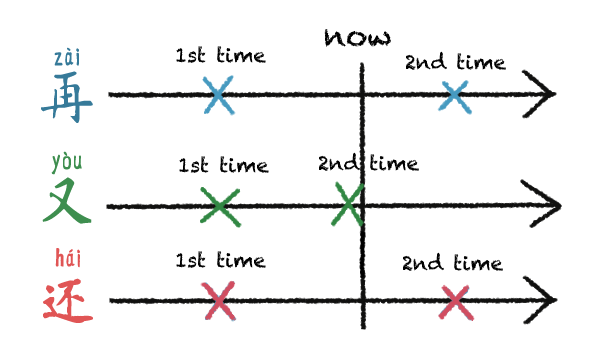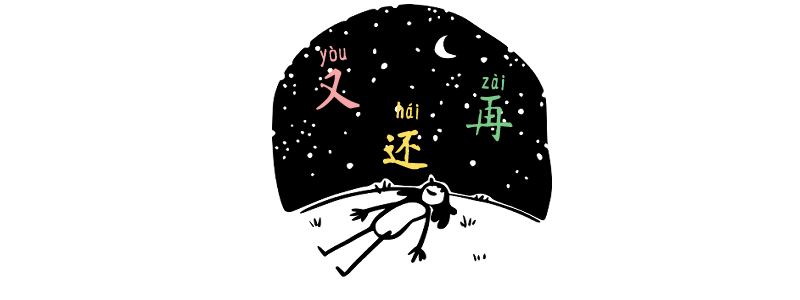The three words 再 zài, 又 yòu, and 还 hái indicate the repetition of the same action and can be translated to “again” in English. However, 又 yòu is used when the repeated action has happened again and there is often a 了le at the end of the sentence. In contrast, 再 zài is used when the repeated action has not happened yet. 还 hái also indicates a future repetition of an action but suggests a prearranged or premeditated repetition.

Structure
S + 再 + V
This is the only “again” that can be used in an imperative sentence. When there is an optative verb, always put 再 zài after it. Remember, it is used to indicate something that has happened already and may happen again in the future.
妳說錯了,請你再說一次妳说错了,请你再说一次
You’re wrong. Please say it again.
(An imperative sentence)
她今天不在家,你明天再來吧她今天不在家,你明天再来吧
She is not at home today, come back again tomorrow.
我絕對不會再去那家餐廳我绝对不会再去那家餐厅
I will never go back to that restaurant again.
S + 又 + V
Remember, 又 yòu is used to indicate something that has happened before and is happening again now or in the past. It is often used with a 了 le at the end of the sentence. However, 又 yòu can also be used in a hypothetical action. If there is an optative verb (such as 想 xiǎng, 要 yào, 希望 xīwàng), always put 又 yòu before it.
妳上次說錯,這次又說錯了妳上次说错,这次又说错了
You were wrong last time, and you’re wrong again this time.
妳上次說錯,這次又說錯了妳上次说错,这次又说错了
I told you she wasn’t home today, so why did you come again?
如果我又想去那家餐廳,那我一定是醉了如果我又想去那家餐厅,那我一定是醉了
If I want to go to that restaurant again, then I must be drunk.
(hypothesis action)
S + 還/还 + 要, 會/会, or 想 + V
还 hái suggests a prearranged or pre-planned repetition, meaning it depends on your willingness. Unlike 再 zài and 又 yòu, it cannot directly connect with a verb. However, it can be used with 再 zài for emphasis.
這病需要時間,我下星期還要去看醫生这病需要时间,我下星期还要去看医生
This sickness takes time, I have to go to the doctor next week again.
那本書我還沒看完,所以明天我還會去圖書館那本书我还没看完,所以明天我还会去图书馆
I haven’t finished the book yet, so I’ll go back to the library tomorrow again.
我還想再去一次歐洲我还想再去一次欧洲
I would like to go to Europe again.
How about 重 chóng?
The function of 重 chóng is not really like a word or grammar, is more like a word root “re-” in English. It is always combined with a verb.
聽說老闆要你把報告重做听说老板要你把报告重做
I heard that your boss wants you to redo the report.
電腦重開機後應該會比較快电脑重开机后应该会比较快
The computer should be faster after rebooting.
我再重說一次,這個客戶很重要我再重说一次,这个客户很重要
Let me re-say it again, this customer is very important.
- Connecting Adjective with 又:又 you… 又 you… (HSK 2)
- Express the order in Chinese with 先 xiān…再 zài… (HSK 3)


